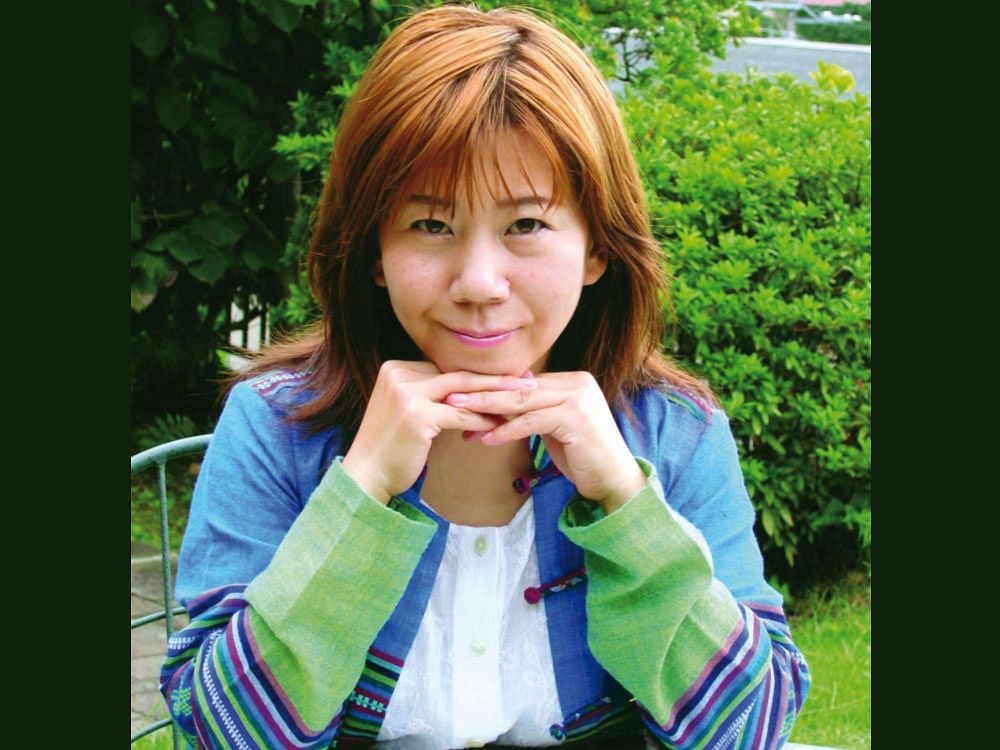Randy Taguchi, who was in Guwahati recently, writes short stories and novels based on dysfunctional families and depression. Her online magazine has a huge international readership, writes Ranjita Biswas
Randy Taguchi is a writer of ‘today.’ In Japan, she is known as ‘the queen of Internet.’ Her weekly posts attract a huge readership from across the world.
The writer was recently in Guwahati to participate in the first Brahmaputra Literary Festival. It was her first visit to eastern India though she has been to the country once before. She was charmed by landscape as well as the similarities she found between certain elements in India and her homeland.
On her foray into writing in the cyber-world, Randy says, “I started writing for the Internet in 1996. It was something of a pioneering effort. At that time, there were over 1 lakh readers regularly subscribing to my email magazine. For the first time in Japan, a writer got so many readers on the Internet, people said. Perhaps that’s why they gave me the title.”
All things lost
Randy writes short stories, novels and travelogues. Most of her writing is set in contemporary Japan and deals with loneliness and dysfunctional families.
“After the Second World War, Japan grew economically and we became a developed country. However, sacrifice was necessary for growth. The Japanese are suffering now because, in the process of growing, so many things got lost,” she says. “What did we lose, people ask. It is something that is invisible. Connection, trust, a sense of security, dignity of life.”
Randy herself emerged from an unhappy childhood to carve out her own life and those scars often show up in her writings. “My brother’s suicide triggered me to write a novel. The theme of the novel was very spiritual and religious,” she says.
The writer grew up in the beautiful Ibaragi prefecture in rural Japan at the foot of Mount Tsukuba. The beauty of nature was in contrast with her stressful life and eventually she escaped to the city to start afresh.
Randy’s father was an alcoholic who often beat up the members of the family. Her brother, who was eight years older than her, was abused, as was her mother.
“Fortunately, I was never abused. But it was very painful to see my family suffering. Both the father who abuses and the family who is being abused suffer. I could understand both their sufferings. So I was saved,” Randy says.
Depression in the modern world
The novel, translated in English as Outlet (Konsento in Japanese), was praised by leading Japanese writer Ryu Murakami as ‘one of the best novels’ he had read in a decade. It was also short-listed for the prestigious Naoki Prize.
Taguchi looks unblinkingly at contemporary Japanese society – a tech-savvy, modern society – where robots are a common toy. “The family system is collapsing. The number of middle-aged and elderly people is increasing, so is loneliness. Since the average life expectancy of Japanese people is long, an increasing number of young adults are left to care for their elderly parents. This often leads to resentment, as societal expectations and own limitations clash.”
This trend could be evident elsewhere in the world too, Randy says. “With an increasingly graying population, middle-age depression is becoming a common phenomenon. Even so-called traditional societies like India and China, where the elderly are supposed to be looked after by the children, are not exempt.”
Besides her writing, Taguchi is involved in a lot of social activities in Japan. For example, she works towards providing support for people with disabilities; exchanging views with death row prisoners; improving school education, etc.
Camping in Fukushima
She is also deeply involved with a research group on nuclear power plant problems, particularly after the Fukushima nuclear plant disaster in 2011, though she was doing it even prior to the accident. The seminars and workshops are held in the University of Tokyo where the general public also take part.
A related programme she holds dear is named the Fukushima Kids, whereby she takes young children to Fukushima for a 40-day summer camp in an area of the prefecture that is considered radiation-free. She says, after the incident, people have become very nervous as they lead a stressful life. “The idea is to make the children relax and have a good time in the open with friends.”
On her recent visit to Guwahati, she went to the Shakti temple (Kamakhya) and “found out that I wrote about the Shakti in my first novel. It was very similar to a place in Japan. I feel there is a very old and deep connection between India and Japan.”
Randy also felt through interaction with the people and the welcome extended everywhere that “India is full of possibilities. The old and new coexist and there’s the power to accept diversity. And there are so many young people!”
